UnsaidTalks Mentorship Program
Step Towards Your Dream Job Today
Master Core Electronics Interviews for Top Companies like
Nvidia, Intel, ARM, NXP Semiconductors, etc.
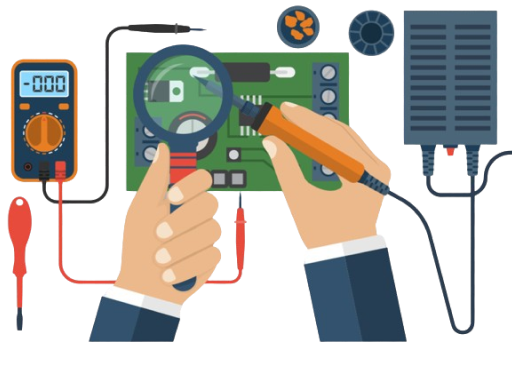
Join our Next Cohort
Mentorship
by Industry Experts
Start Date
27th Feb 2026
Enrolment Ends
25th Feb 2026
Join our Next Cohort
Mentorship
by Industry Experts
Start Date
27th Feb 2026
Enrolment Ends
25th Feb 2026
Why Join This Program?







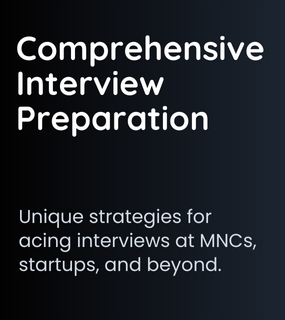
Who Is This Program For?
Our program is ideal for electronics engineering students in their 2nd, 3rd year who want to gain industry-specific skills and prepare for competitive job interviews.
Build a strong foundation with expert guidance, helping you excel in both your academic studies and future career pursuits in the electronics field.
Prepare comprehensively for internships and job interviews, gaining a competitive edge in the job market and boosting your confidence and skills.
Mentorship Program Curriculum
Overview:
- Welcome and introduction to the program
- Overview of program structure and expectations
- Introduction of mentors and mentees
- Guidelines for participation and engagement
Key Takeaways:
- Clear understanding of program layout and objectives
- Introduction to fellow participants and mentors
Overview:
- Introduction to core electronics industry and subdomains
- Types of profiles, target companies, and current market scenarios
- Insight into product design across companies and choosing a fulfilling subdomain
- Life in different ECE domains, including perks, work-life balance, job security, and innovation scope
Key Takeaways:
- Clear understanding of career paths and strategies for choosing an ideal domain
- Structured view of industry classifications and specific fields within electronics/communication
Overview:
- High-level perspective on the components and structure within an SOC chip
- Basics of Static Timing Analysis (STA)
- End-to-end flow of chip design
Key Takeaways:
- Comprehensive understanding of the digital domain and its market scenario
- Fundamental knowledge of STA
- Complete overview of the chip design process
Overview:
- Overview of different profiles in Analog and their roles
- Key subjects and topics to focus on for Analog profiles
- Effective approach to studying Analog
- Introduction to Linux and scripting languages, highlighting their importance
- Tips for preparing for written exams
- Mentor’s industry experience and work overview
Key Takeaways:
- Complete understanding of the analog domain and its market scenario
- Insights into layout design
- Overview of various subdomains within analog
Overview:
- In-depth look at profiles in Wireless and Communication
- Exploration of Embedded Systems roles
- Overview of IC Fabrication processes and industry practices
Key Takeaways:
- Detailed understanding of each profile and an inside view of industry work
Overview:
- Mapping industry requirements to relevant college subjects for digital profiles, focusing on key areas like digital electronics, HDL (e.g., Verilog), VLSI basics (MOSFET fundamentals), and Embedded Systems
- Study strategies and essential topics for excelling in digital roles, including written exam preparation
- Practical interview tips and mentor experiences
Key Takeaways:
- Knowledge of core topics essential for digital profiles, including digital electronics, HDL, VLSI, and Embedded Systems
- Effective strategies for written exams and interview success in digital domains
Overview:
- Mapping industry requirements to key college subjects for Analog profiles
- Effective strategies for written exams, interview tips, and insights from mentor experiences
- Core topics essential for Analog roles, including CMOS configurations, RLC circuits, and Semiconductor Physics (Diode configurations)
- In-depth review of foundational concepts: Electrical and RLC circuits (filters, damping, oscillators), OpAmp, Control Systems, EMFT, and signal processing fundamentals like aliasing, sampling, and convolution
Key Takeaways:
- Clear understanding of industry-relevant subjects and their importance for Analog profiles
- Comprehensive knowledge of key technical concepts (CMOS, RLC, OpAmp, etc.) crucial for interviews
- Practical preparation tips for written exams and interview success in the Analog domain
Overview:
- Discover the core purpose of Functional Verification in hardware design and its pivotal role in ensuring chip reliability.
- Learn why this field offers a large number of job opportunities, especially in the growing semiconductor sector.
- Gain exposure to simulation methodologies for creating and verifying designs from scratch.
- Get started with scripting languages like Verilog and System Verilog to write testbenches and validate designs.
- Dive into RTL (Register Transfer Level): Understand how it bridges design and implementation in the verification process.
Key Takeaways:
- Clear understanding of Functional Verification and its critical role in ensuring hardware design reliability.
- Awareness of the abundant job opportunities and the growing demand for professionals in this domain.
- Practical knowledge of simulation methodologies to create and validate hardware designs.
- Hands-on familiarity with Verilog and System Verilog scripting for writing and executing testbenches.
- Solid grasp of RTL (Register Transfer Level) concepts and their application in the verification process.
Overview:
- Understand the stages of the PNR flow and its impact on chip design.
- Learn Python and TCL scripting for backend automation.
- Perform Timing Analysis to ensure design reliability.
- Get hands-on with Linux systems for backend workflows.
- Prepare for Physical Design interview questions.
Key Takeaways:
- Clear understanding of the PNR flow and its importance.
- Ability to analyze timing for design optimization.
- Practical knowledge of Linux commands for design tasks.
- Key insights to ace Physical Design interviews.
Overview:
- Where to apply for internships.
- Understand the types of projects to discuss in interviews.
- Master the right way to explain your project.
- Explore project ideas and how to build them
Key Takeaways:
- Know the best platforms for finding internships.
- Identify impactful projects for interviews.
- Learn to explain your project confidently and clearly.
- Get practical ideas for creating industry-relevant projects.
Overview:
- Best Strategies to crack off-campus placements with appropriate outbound strategies
- Career paths after a bachelor’s degree: M.Tech, MS, PhD, and their respective benefits
- Comparing the value of pursuing an MS abroad versus gaining two years of industry experience
- Key steps in the MS application process and available research opportunities in Electronics
- Insights on earning potential and long-term career growth with advanced degrees
Key Takeaways:
- Clear understanding of postgraduate options and their impact on career advancement
- Knowledge of the MS application process and research opportunities
- Insights into the earning potential and benefits of advanced degrees
Overview:
- Tips for curating an effective resume.
- Understanding different resume formats and structures.
- Advice on presenting oneself through career platforms.
- Insights from HR professionals.
- Understanding compensation letters and common resume mistakes.
Key Takeaways:
- Enhanced resume writing skills.
- Knowledge of ATS filtering and how to avoid common mistakes.
Overview:
- Summary of the program and key takeaways.
- Opportunity for participants to ask final questions and provide feedback.
- Discussion on next steps and future opportunities.
Key Takeaways:
- Consolidated understanding of the program.
- Clear direction for future career steps.
- Valuable feedback for continuous improvement.
- Best ways to leverage UnsaidTalks Exclusive Community access for continuous growth and support until you crack your first interview!
Mentorship Program Curriculum
- Session 0
- Session 1
- Session 2
- Session 3
- Session 4
- Session 5
- Session 6
- Session 7
- Session 8
- Session 9
- Session 10
- Session 11
- Session 12
Welcome & Introduction To The Program And Mentors
Overview:
- Welcome and introduction to the program
- Overview of program structure and expectations
- Introduction of mentors and mentees
- Guidelines for participation and engagement
Key Takeaways:
- Clear understanding of program layout and objectives
- Introduction to fellow participants and mentors
All About Core Electronics Companies And Its Subdomains
Overview:
- Introduction to core electronics industry and subdomains
- Types of profiles, target companies, and current market scenarios
- Insight into product design across companies and choosing a fulfilling subdomain
- Life in different ECE domains, including perks, work-life balance, job security, and innovation scope
Key Takeaways:
- Clear understanding of career paths and strategies for choosing an ideal domain
- Structured view of industry classifications and specific fields within electronics/communication
Detailed Overview Of Digital Domain
Overview:
- High-level perspective on the components and structure within an SOC chip
- Basics of Static Timing Analysis (STA)
- End-to-end flow of chip design
Key Takeaways:
- Comprehensive understanding of the digital domain and its market scenario
- Fundamental knowledge of STA
- Complete overview of the chip design process
Detailed Overview Of Analog Domain
Overview:
- Overview of different profiles in Analog and their roles
- Key subjects and topics to focus on for Analog profiles
- Effective approach to studying Analog
- Introduction to Linux and scripting languages, highlighting their importance
- Tips for preparing for written exams
- Mentor’s industry experience and work overview
Key Takeaways:
- Complete understanding of the analog domain and its market scenario
- Insights into layout design
- Overview of various subdomains within analog
What’s Beyond Digital & Analog In Electronics
Overview:
- In-depth look at profiles in Wireless and Communication
- Exploration of Embedded Systems roles
- Overview of IC Fabrication processes and industry practices
Key Takeaways:
- Detailed understanding of each profile and an inside view of industry work
Preparing For Digital Interviews
Overview:
- Mapping industry requirements to relevant college subjects for digital profiles, focusing on key areas like digital electronics, HDL (e.g., Verilog), VLSI basics (MOSFET fundamentals), and Embedded Systems
- Study strategies and essential topics for excelling in digital roles, including written exam preparation
- Practical interview tips and mentor experiences
Key Takeaways:
- Knowledge of core topics essential for digital profiles, including digital electronics, HDL, VLSI, and Embedded Systems
- Effective strategies for written exams and interview success in digital domains
Preparing For Analog Interviews
Overview:
- Mapping industry requirements to key college subjects for Analog profiles
- Effective strategies for written exams, interview tips, and insights from mentor experiences
- Core topics essential for Analog roles, including CMOS configurations, RLC circuits, and Semiconductor Physics (Diode configurations)
- In-depth review of foundational concepts: Electrical and RLC circuits (filters, damping, oscillators), OpAmp, Control Systems, EMFT, and signal processing fundamentals like aliasing, sampling, and convolution
Key Takeaways:
- Clear understanding of industry-relevant subjects and their importance for Analog profiles
- Comprehensive knowledge of key technical concepts (CMOS, RLC, OpAmp, etc.) crucial for interviews
- Practical preparation tips for written exams and interview success in the Analog domain
Simulations & Functional Verification
Overview:
- Discover the core purpose of Functional Verification in hardware design and its pivotal role in ensuring chip reliability
- Learn why this field offers a large number of job opportunities, especially in the growing semiconductor sector
- Gain exposure to simulation methodologies for creating and verifying designs from scratch.
- Get started with scripting languages like Verilog and System Verilog to write testbenches and validate designs.
- Dive into RTL (Register Transfer Level): Understand how it bridges design and implementation in the verification process
Key Takeaways:
- Clear understanding of Functional Verification and its critical role in ensuring hardware design reliability
- Awareness of the abundant job opportunities and the growing demand for professionals in this domain
- Practical knowledge of simulation methodologies to create and validate hardware designs.
- Hands-on familiarity with Verilog and System Verilog scripting for writing and executing testbenches
- Solid grasp of RTL (Register Transfer Level) concepts and their application in the verification process
Backend Design
Overview:
- Understand the stages of the PNR flow and its impact on chip design
- Learn Python and TCL scripting for backend automation
- Perform Timing Analysis to ensure design reliability
- Get hands-on with Linux systems for backend workflows
- Prepare for Physical Design interview questions
Key Takeaways:
- Clear understanding of the PNR flow and its importance
- Ability to analyze timing for design optimization.
- Practical knowledge of Linux commands for design tasks
- Key insights to ace Physical Design interviews
Internships & Identifying Meaningful Projects
Overview:
- Where to apply for internships
- Understand the types of projects to discuss in interviews
- Master the right way to explain your project
- Explore project ideas and how to build them
Key Takeaways:
- Know the best platforms for finding internships
- Identify impactful projects for interviews
- Learn to explain your project confidently and clearly
- Get practical ideas for creating industry-relevant projects
Off-Campus Placement Strategy & Future Career Prospects – M.Tech / MS Opportunities
Overview:
- Best Strategies to crack off-campus placements with appropriate outbound strategies
- Career paths after a bachelor’s degree: M.Tech, MS, PhD, and their respective benefits
- Comparing the value of pursuing an MS abroad versus gaining two years of industry experience
- Key steps in the MS application process and available research opportunities in Electronics
- Insights on earning potential and long-term career growth with advanced degrees
Key Takeaways:
- Clear understanding of postgraduate options and their impact on career advancement
- Knowledge of the MS application process and research opportunities
- Insights into the earning potential and benefits of advanced degrees
Building Your Resume & Preparing For HR Round
Overview:
- Tips for curating an effective resume
- Understanding different resume formats and structures
- Advice on presenting oneself through career platforms
- Insights from HR professionals
- Understanding compensation letters and common resume mistakes
Key Takeaways:
- Enhanced resume writing skills
- Knowledge of ATS filtering and how to avoid common mistakes
Closing Session & Doubt Clearing Session
Overview:
- Summary of the program and key takeaways
- Opportunity for participants to ask final questions and provide feedback
- Discussion on next steps and future opportunities
Key Takeaways:
- Consolidated understanding of the program
- Clear direction for future career steps
- Valuable feedback for continuous improvement
- Best ways to leverage UnsaidTalks Exclusive Community access for continuous growth and support until you crack your first interview!
Meet Your Mentors
Learn from Our Talented And Highly Qualified Mentors.
Meet Your Mentors
Learn from Our Talented And Highly Qualified Mentors.






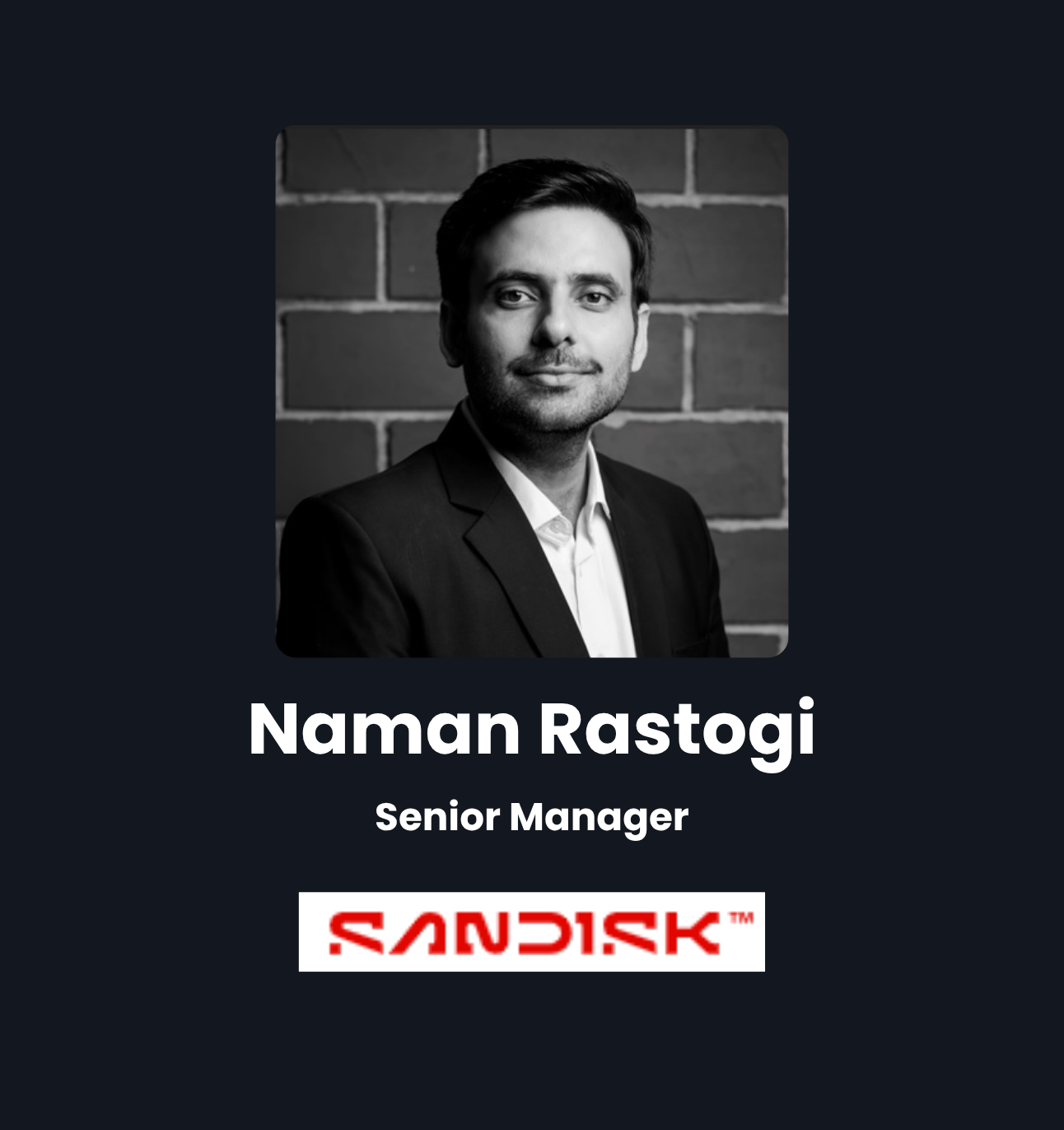

See What Our Students Have To Say About Us
From the Heart of Our Mentees




It is one of the best guidance session to crack placement. The resource you provided is so good and helped a lot and every point they teach us it is a very good key points.
Choose Your Path to Success
Select the plan that best fits your needs and career goals. All plans include our core curriculum and success methodology.
Starter Plan
₹5,000 ₹3,499 one-time
Perfect for self-motivated students who need structure and fundamentals.
Choose Starter- Anybody can enroll
- 12 recorded sessions
- Live Sessions with Industry Professionals
- Structured Tasks & Resources
- 1 Year Content Access
- 1 Year Community Access
- Industry Oriented Project Assistance
- Guaranteed Internship / Placement within 12 Months Or else 50% Upfront fee Refund.
- Mock Interviews
- Targeted Interview Preparation
Advanced Plan
₹15,000 ₹11,999 one-time
For students who want personalized guidance and live interactions.
Choose Advanced- Selection Process
- 12 Recorded Sessions
- 3 Live Sessions with Industry Professionals
- Structured Tasks & Resources
- 1 Year Content Access
- 1 Year Community Access
- Industry Oriented Project Assistance
- Guaranteed Internship / Placement within 12 Months Or else 50% Upfront fee Refund.
- 3 AI Mock Interviews
- Targeted Interview Preparation
Ultimate Plan
₹30,000 ₹14,999 upfront
+ 1 month Salary (Only after you get an Internship/Job)
For determined students who want guaranteed results.
Choose Ultimate- Strong Selection Process
- 12 Recorded Sessions
- Unlimited Live sessions (1:1) with Industry Professionals
- Structured Tasks & Resources
- 2 Year Content Access
- 2 Year Community Access
- Industry Oriented Project Assistance
- Guaranteed Internship / Placement Support
- 2 Mentor + 6 AI Mock Interviews
- Targeted Interview Preparation
Application Process
Fill a detailed Application Form answering 8+ questions around your CGPA, LinkedIn profile, goals, why mentorship, etc.
Mentors screen your application and If you get shortlisted, You are invited for 1:1 interview call with a mentor.
Pay enrollment fee and block your seat. Wait for program start date and let the most exciting journey of your career begin!
From Our Community Support
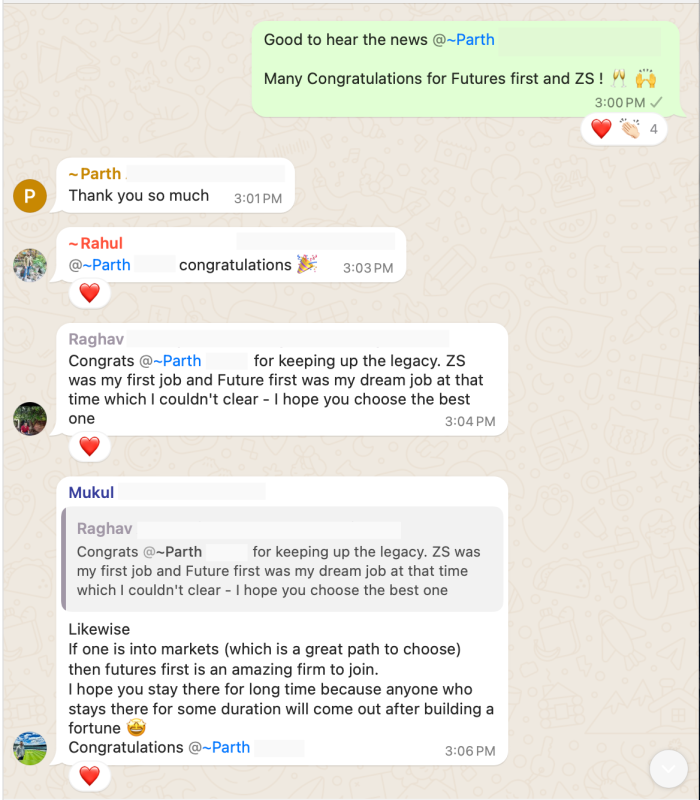
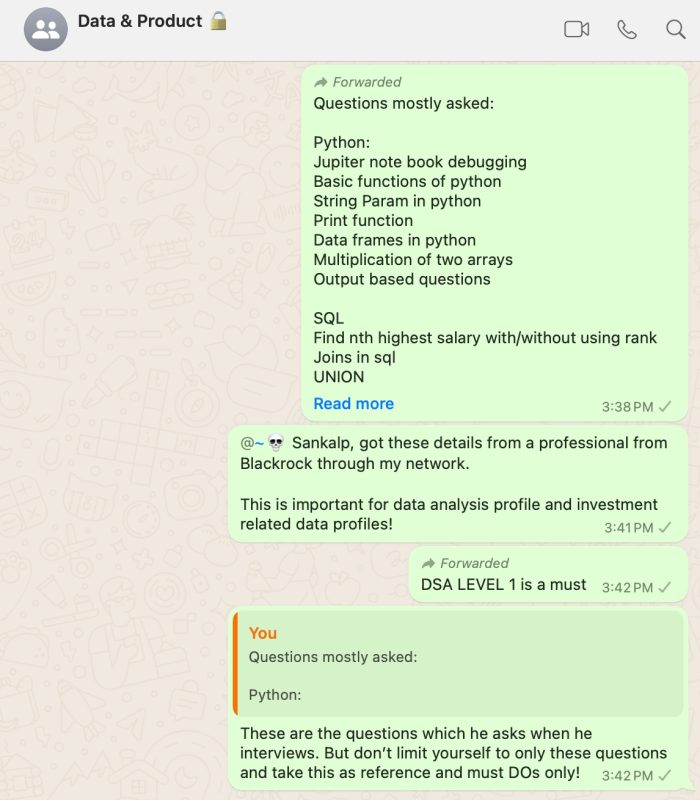
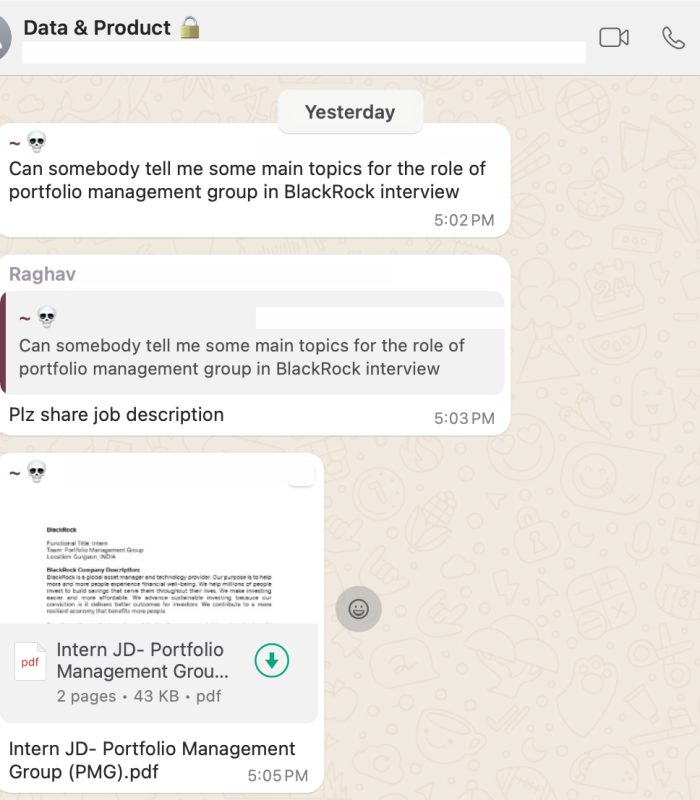
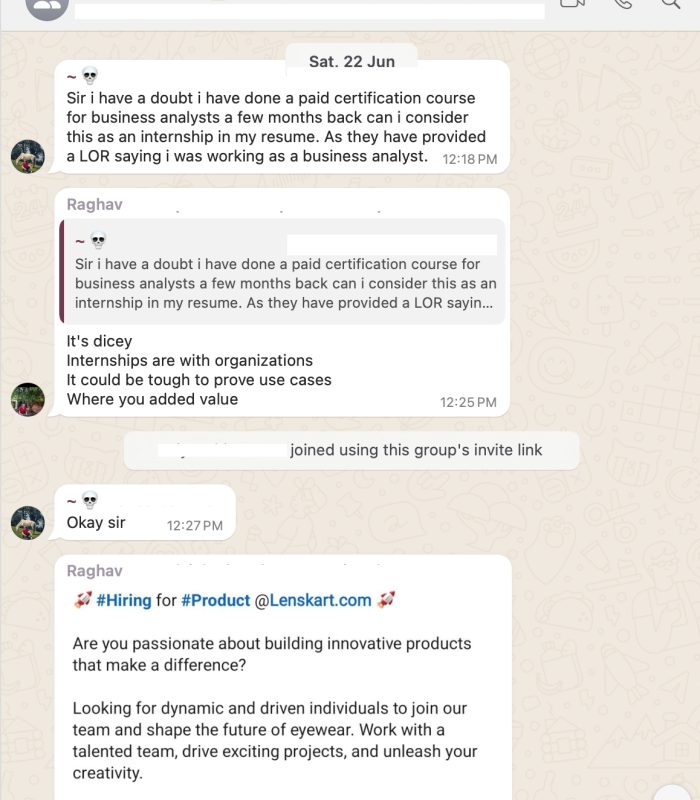

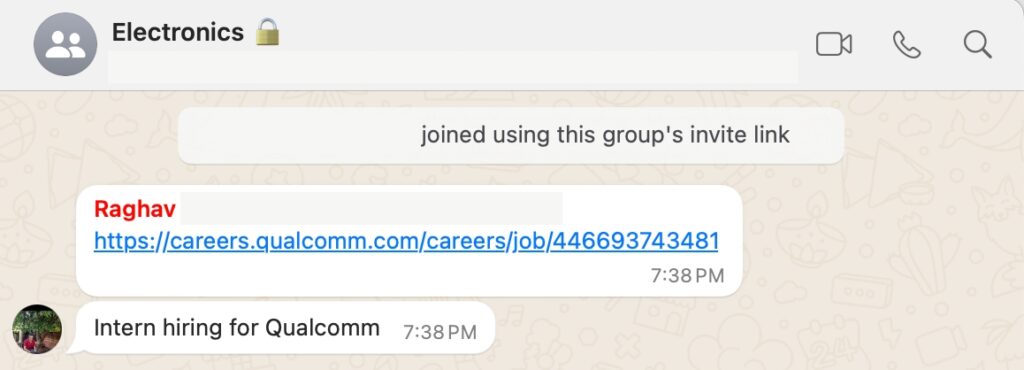
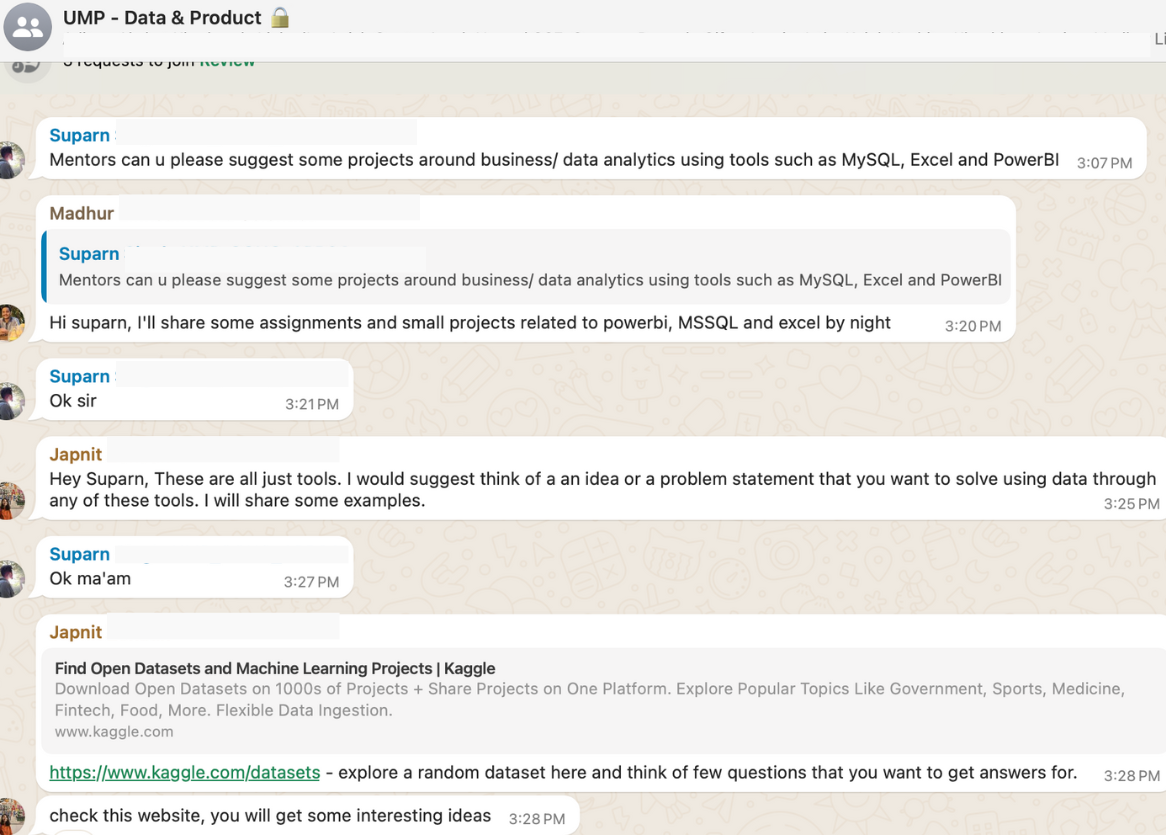
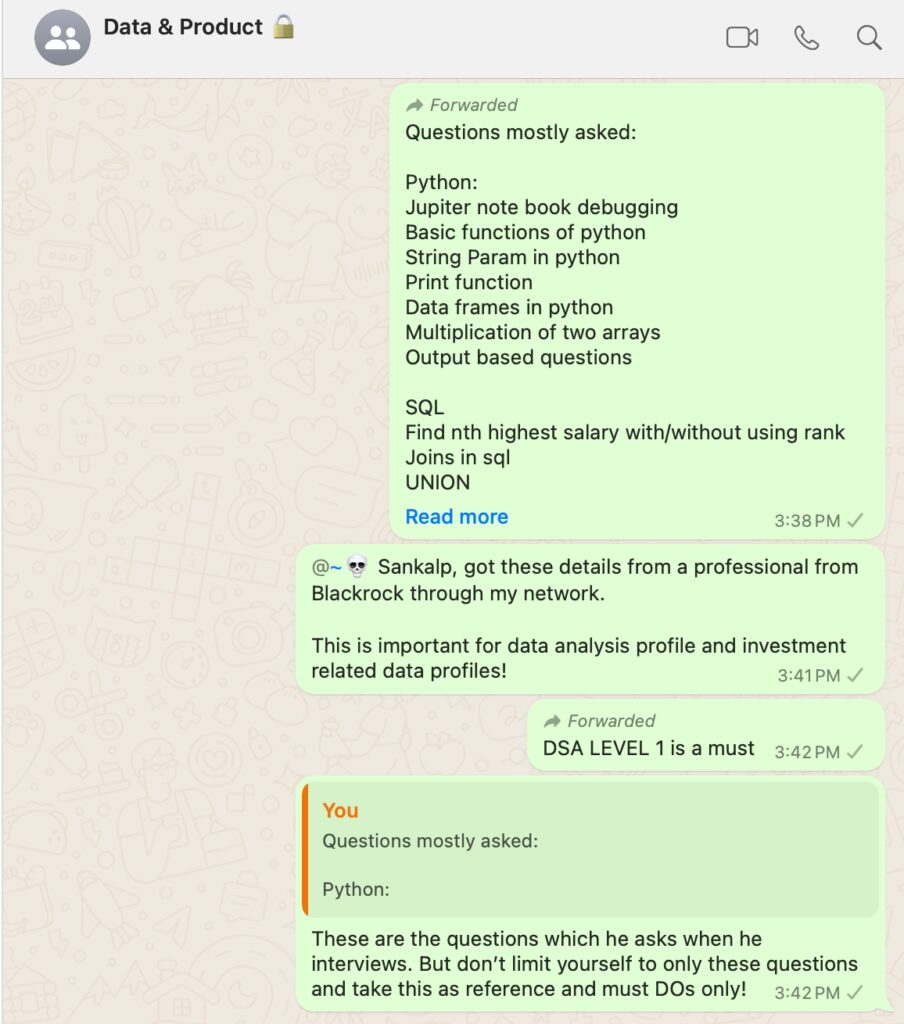
From Our Community Support
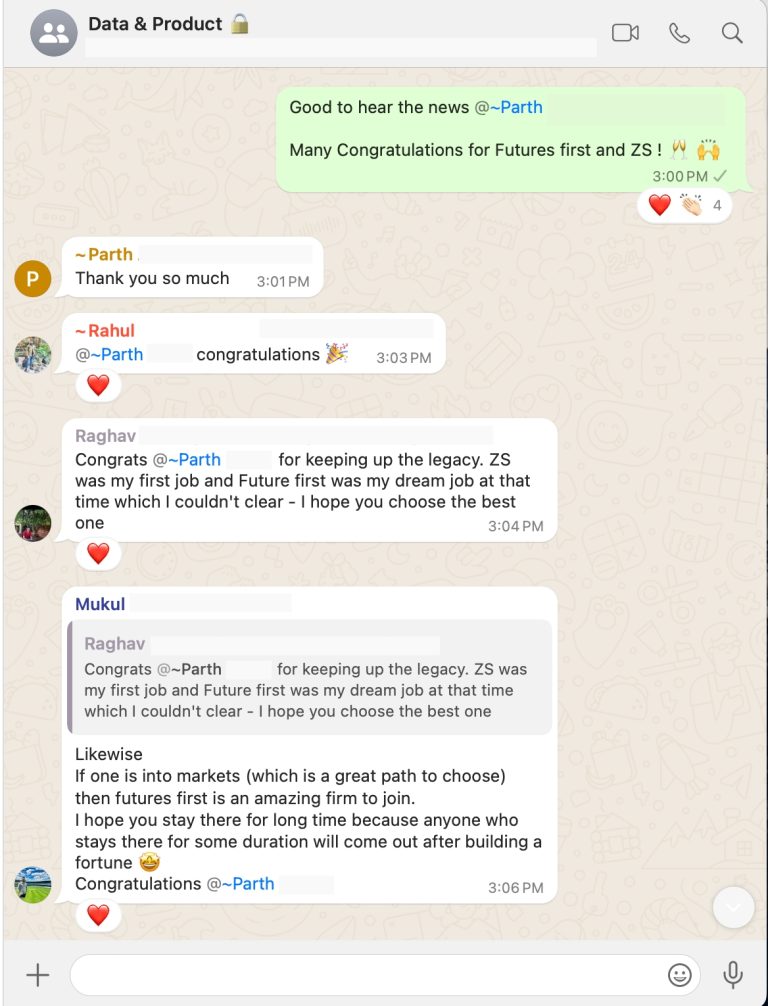



Crack Core Electronics Interviews with Industry Professionals
Frequently Asked Questions
Q. How do I enroll in the mentorship program?
A. You can enroll by visiting our website and completing the registration form. Once submitted, our team will reach out to guide you through the process.
Q. Can I access course materials after completing the program?
A. Yes, you will have access to course materials even after completing the program for continued learning and reference.Q. Is there a refund policy if I’m not satisfied with the program?
A. Yes, we offer a satisfaction guarantee. If you’re not satisfied, let us know within the first 3 days and you will get a full refund.Q. How can I connect with other participants in the community?
A. You can interact with other participants through our online community platform, where you can engage in discussions, share insights, and network.Q. Are there any prerequisites for joining the mentorship program?
A. No, there are no specific prerequisites. The program is designed to accommodate participants at various skill levels and backgrounds.Q. What sets this mentorship program apart from others in the market?
A. Our program offers personalized mentorship from industry experts, a vibrant community for networking, and a comprehensive curriculum tailored to your career goals.Q. What topics are covered in the recorded sessions?
A. Recorded sessions cover a wide range of topics, including technical skills, interview preparation, career development, and more.Q. How often are live sessions conducted, and can I attend them later if I miss them?
A. There are three live sessions in this program, and recordings are made available for participants who are unable to attend live.Q. Is there a structured curriculum, or can I customize my learning path?
A. The program has been structured to increase the learning potential of the students and get in-line with their interests and goals.Q. How can I track my progress throughout the program?
A. You get access to our LMS portal where all the sessions are available so you can easily track your progressQ. What is the time and duration of the sessions?
A. Each session will be of 1-1.5 hrs duration and a total of 7 pre-recorded sessions will be there and 3 live sessions. The exact date & time of live session will be told once the program begins.Expertise Related
Q. What are the qualifications and industry experience of the instructors and mentors?
A. Our instructors and mentors are industry professionals with extensive experience and expertise in their respective fields.Q. Can I schedule one-on-one sessions with mentors outside of the designated live sessions?
A. Yes, participants have the opportunity to schedule one-on-one sessions with mentors for personalized guidance and support at an extra nominal fees only after completion of the program.Q. Are mentors available for career guidance and job placement assistance?
A. Yes, mentors offer career guidance, job placement assistance, and insights into industry trends and opportunities in recorded sessions as well as live sessions.Q. Can mentors help me with specific technical or industry-related questions?
A. We have live sessions where you can ask the mentor regarding specific technical or industry-related questions and provide expert advice.Q. How are mentors matched with participants based on their career goals and interests?
A. All our mentors are seasoned professionals working for MNC’s they are well versed with all the queries that the students may incurQ. What are the payment options available for the mentorship program?
A. We accept various payment methods, including credit/debit cards, bank transfers, and online payment platforms.Q. Is there a deadline for payment, and when is the payment due?
A. Payment deadlines and due dates are specified during the enrollment process and may vary depending on the program schedule.Q. Can I pay in installments, or is the full payment required upfront?
A. We offer flexible payment options, including installment plans, to accommodate different financial situations.Q. Is there a discount available for early registration or group enrollment?
A. Currently there are no discounts available since we charge a very nominal fee for the program but you can always contact our team for further information.Q. What is the process for requesting a refund if needed?
A. If you’re not satisfied with the program, you can request a refund within the first 3 day of the program starting date by contacting our support team. We’ll process your refund promptly and efficiently- General Queries
- Course Content & Learning Related
- Instructor and Mentor Expertise Related
- Payment Related
Q. How do I enroll in the mentorship program?
A. You need to apply by filling our Detailed Application Form. If your application is shortlisted, you will then go through 1:1 Interview with Mentor. Basis your interaction with Mentor, you will be shortlisted for the program. You can then make the payment and get enrolled!
Q. Can I access course materials after completing the program?
A. Yes, you will have access to course materials even after completing the program for continued learning and reference.
Q. Is there a refund policy if I’m not satisfied with the program?
A. Yes, we offer a satisfaction guarantee. If you’re not satisfied, let us know within the first 3 days and you will get a full refund.
Q. How can I connect with other participants in the community?
A. You can interact with other participants through our online community platform, where you can engage in discussions, share insights, and network.
Q. Are there any prerequisites for joining the mentorship program?
A. The major prerequisite is that student has to be from electronics domain. Apart from this, being ambitious, humble and always learning attitude will help in getting shortlisted for this program.
Q. What sets this mentorship program apart from others in the market?
A. Our program offers mentorship from industry people who are passionate about helping budding engineers as a way to give back to community. Apart from this students get a vibrant community for networking and a comprehensive curriculum tailored to the goal of cracking dream core electronics interviews.
Q. What topics are covered in the recorded sessions?
A. There are 12 Live sessions conducted over weekends keeping in mind the schedule of students. During weekdays you have to read provided resources and complete tasks as assigned. You will be provided with the session recordings as well in case you miss the session.
Q. How often are live sessions conducted, and can I attend them later if I miss them?
A. There are 12 live sessions in this program which are conducted over weekends and recordings are made available for participants who are unable to attend live.
Q. Is there a structured curriculum, or can I customize my learning path?
A. The program has been structured to increase the learning potential of the students and get in-line with their interests and goals.
Q. How can I track my progress throughout the program?
A. You get access to our LMS portal where all the sessions are available so you can easily track your progress
Q. What is the time and duration of the sessions?
A. Each Session will be of 1-1.5 hours duration and total of 12 live sessions. The exact date and time of live sessions will be told once the program begins. But the sessions are planned in a way to accomodate students hectic college schedule as well.
Q. What are the qualifications and industry experience of the instructors and mentors?
A. Our instructors and mentors are industry professionals with extensive experience and expertise in their respective fields.
Q. Can I schedule one-on-one sessions with mentors outside of the designated live sessions?
A. Yes, participants have the opportunity to schedule one-on-one sessions with mentors for personalized guidance and support at an extra nominal fees only after completion of the program.
Q. Are mentors available for career guidance and job placement assistance?
A. Yes, mentors offer career guidance, job placement assistance, and insights into industry trends and opportunities in recorded sessions as well as live sessions.
Q. Can mentors help me with specific technical or industry-related questions?
A. We have live sessions where you can ask the mentor regarding specific technical or industry-related questions and provide expert advice.
Q. What are the payment options available for the mentorship program?
A. We accept various payment methods, including credit/debit cards, bank transfers, and online payment platforms.Q. Is there a deadline for payment, and when is the payment due?
A. Payment deadlines and due dates are specified during the enrollment process and may vary depending on the program schedule.Q. Can I pay in installments, or is the full payment required upfront?
A. We offer flexible payment options, including installment plans, to accommodate different financial situations.Q. Is there a discount available for early registration or group enrollment?
A. Currently there are no discounts available since we charge a very nominal fee for the program but you can always contact our team for further information.Q. What is the process for requesting a refund if needed?
A. If you’re not satisfied with the program, you can request a refund within the first 3 day of the program starting date by contacting our support team. We’ll process your refund promptly and efficiently.